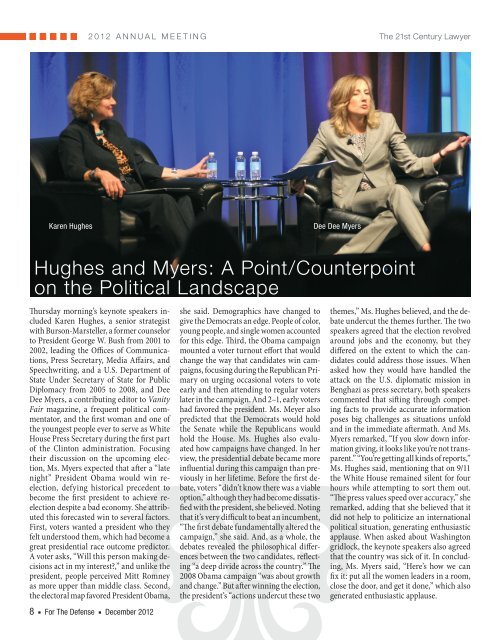For The Defense, December 2012 - DRI Today
For The Defense, December 2012 - DRI Today
For The Defense, December 2012 - DRI Today
Create successful ePaper yourself
Turn your PDF publications into a flip-book with our unique Google optimized e-Paper software.
<strong>2012</strong> AnnuAl Meeting the 21st Century lawyer<br />
Karen Hughes Dee Dee Myers<br />
Hughes and Myers: A Point/Counterpoint<br />
on the Political Landscape<br />
Thursday morning’s keynote speakers included<br />
Karen Hughes, a senior strategist<br />
with Burson- Marsteller, a former counselor<br />
to President George W. Bush from 2001 to<br />
2002, leading the Offices of Communications,<br />
Press Secretary, Media Affairs, and<br />
Speechwriting, and a U.S. Department of<br />
State Under Secretary of State for Public<br />
Diplomacy from 2005 to 2008, and Dee<br />
Dee Myers, a contributing editor to Vanity<br />
Fair magazine, a frequent political commentator,<br />
and the first woman and one of<br />
the youngest people ever to serve as White<br />
House Press Secretary during the first part<br />
of the Clinton administration. Focusing<br />
their discussion on the upcoming election,<br />
Ms. Myers expected that after a “late<br />
night” President Obama would win reelection,<br />
defying historical precedent to<br />
become the first president to achieve reelection<br />
despite a bad economy. She attributed<br />
this forecasted win to several factors.<br />
First, voters wanted a president who they<br />
felt understood them, which had become a<br />
great presidential race outcome predictor.<br />
A voter asks, “Will this person making decisions<br />
act in my interest?,” and unlike the<br />
president, people perceived Mitt Romney<br />
as more upper than middle class. Second,<br />
the electoral map favored President Obama,<br />
8 ■ <strong>For</strong> <strong>The</strong> <strong>Defense</strong> ■ <strong>December</strong> <strong>2012</strong><br />
she said. Demographics have changed to<br />
give the Democrats an edge. People of color,<br />
young people, and single women accounted<br />
for this edge. Third, the Obama campaign<br />
mounted a voter turnout effort that would<br />
change the way that candidates win campaigns,<br />
focusing during the Republican Primary<br />
on urging occasional voters to vote<br />
early and then attending to regular voters<br />
later in the campaign. And 2–1, early voters<br />
had favored the president. Ms. Meyer also<br />
predicted that the Democrats would hold<br />
the Senate while the Republicans would<br />
hold the House. Ms. Hughes also evaluated<br />
how campaigns have changed. In her<br />
view, the presidential debate became more<br />
influential during this campaign than previously<br />
in her lifetime. Before the first debate,<br />
voters “didn’t know there was a viable<br />
option,” although they had become dissatisfied<br />
with the president, she believed. Noting<br />
that it’s very difficult to beat an incumbent,<br />
“<strong>The</strong> first debate fundamentally altered the<br />
campaign,” she said. And, as a whole, the<br />
debates revealed the philosophical differences<br />
between the two candidates, reflecting<br />
“a deep divide across the country.” <strong>The</strong><br />
2008 Obama campaign “was about growth<br />
and change.” But after winning the election,<br />
the president’s “actions undercut these two<br />
themes,” Ms. Hughes believed, and the debate<br />
undercut the themes further. <strong>The</strong> two<br />
speakers agreed that the election revolved<br />
around jobs and the economy, but they<br />
differed on the extent to which the candidates<br />
could address those issues. When<br />
asked how they would have handled the<br />
attack on the U.S. diplomatic mission in<br />
Benghazi as press secretary, both speakers<br />
commented that sifting through competing<br />
facts to provide accurate information<br />
poses big challenges as situations unfold<br />
and in the immediate aftermath. And Ms.<br />
Myers remarked, “If you slow down information<br />
giving, it looks like you’re not transparent.”<br />
“You’re getting all kinds of reports,”<br />
Ms. Hughes said, mentioning that on 9/11<br />
the White House remained silent for four<br />
hours while attempting to sort them out.<br />
“<strong>The</strong> press values speed over accuracy,” she<br />
remarked, adding that she believed that it<br />
did not help to politicize an international<br />
political situation, generating enthusiastic<br />
applause. When asked about Washington<br />
gridlock, the keynote speakers also agreed<br />
that the country was sick of it. In concluding,<br />
Ms. Myers said, “Here’s how we can<br />
fix it: put all the women leaders in a room,<br />
close the door, and get it done,” which also<br />
generated enthusiastic applause.


